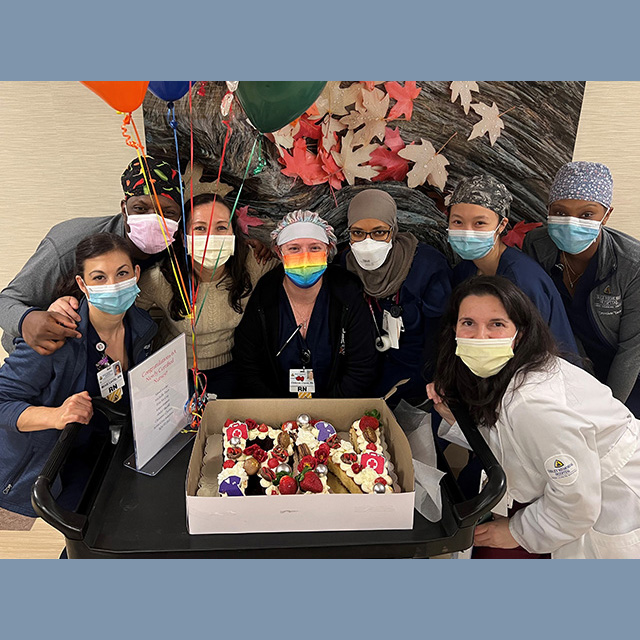One of the newest structures in place at Sibley Memorial Hospital to support the growth and excellence of clinical nurses is the Nursing Clinical Peer Review Committee.
Comprised of volunteer clinical nursing staff and nurse leaders, the committee thoroughly evaluates specific clinical cases submitted for review. Then, the group weighs in on what went well and areas for improvement moving forward.
The committee’s recommendations are intended to give constructive feedback about where nursing practice can be refined or updated so patients continue to receive the best care possible. There are no punitive actions that result from the review.
“The committee comes from an educational place,” says Alicia Hawkins, B.S.N., R.N., a clinical nurse in labor and delivery and recently appointed committee co-chair. “It’s all about growing in our practice and enhancing the way we operate.”
Onyinye Mkparu, M.S.N., M.B.A., R.N., O.C.N., director of oncology nursing at Sibley serves as the committee’s nurse executive advisor. She agrees with the idea of the committee’s educational and practice mission. “It identifies barriers and opportunities and also gives nurses the chance to see if our current practice is effective, needs to be modified, or if it’s time to do more research into best practices and new models.”
Anyone in nursing may submit a case for consideration and review by the Nursing Clinical Peer Review Committee. The committee may also review any significant event in need of nurse-led recommendations for next steps.
A clinical nurse committee member leads the information gathering for every case. Typically, the lead clinical nurse has some knowledge of the unit’s work. The lead nurse presents the findings to the whole committee, and committee members create recommendations based on the findings.
Amy Peterson, B.S.N., R.N.C.-L.R.N., a committee member and clinical nurse in the Silberman Family Special Care Nursery, says that the peer-led research step is crucial to the process because it often helps the nurses involved feel more comfortable sharing the specifics of a case. “Once you explain what you are doing for the committee, people have generally been open to sharing — it gives them a chance to reflect on something that didn’t go as planned,” Peterson says.
As the first committee of its kind at Sibley, one of the biggest challenges the group has needed to overcome was misconceptions about goals. In the next year, they hope to increase understanding of the committee’s work to encourage more clinical nurses to submit cases and serve on the committee.
“We start from the premise that nurses come to work every day planning to do a good job,” says Hawkins. “What do we do when harm occurs or when there are gaps in care? How do we create a transparent process that allows us to identify the gaps? How do we help nurses find ways to close those gaps, which is what we all want?”
Peterson agrees, “Our goal is to make things better. It’s really important for everyone to understand that we’re reviewing a process, not a person.”
“This committee is not punitive. It gives nurses a voice, a chance to come in and say, ‘I don’t think that’s best practice.’ We might identify educational gaps or see an opportunity for quality-improvement initiatives, but overall, our goal is to help people improve,” adds Amy Sawyerr, M.P.H., B.S.N., R.N.C.-L.R.N., director of nursing systems, strategy and operations.
The concept of a Nursing Clinical Peer-Review Committee is relatively new, and Sibley’s committee is the first in the Johns Hopkins Health System. If it becomes a successful and useful tool to enhance clinical excellence, it may not be the last.
Peterson, for one, is enjoying the committee work for several reasons, including what it means for her patients. “My patient asked me if the things they say to hospital staff are actually heard and addressed. With confidence, I could tell them that I knew their voice would be heard.”

